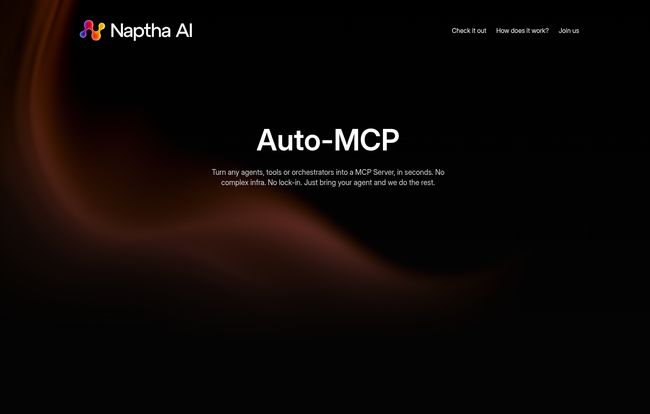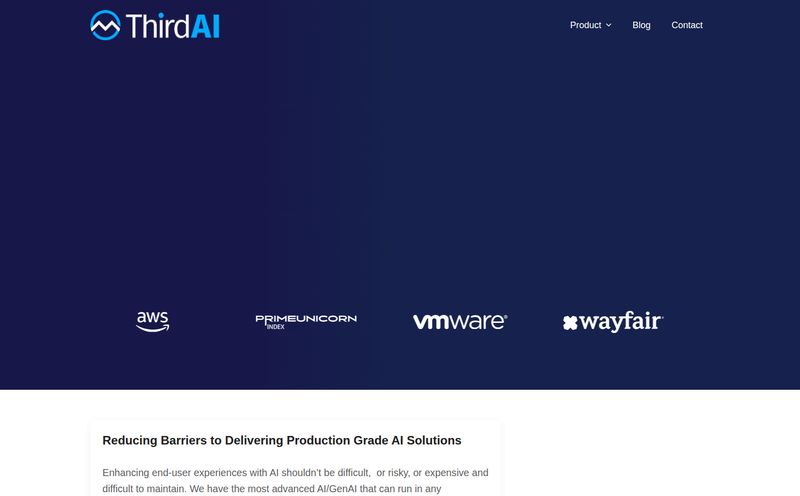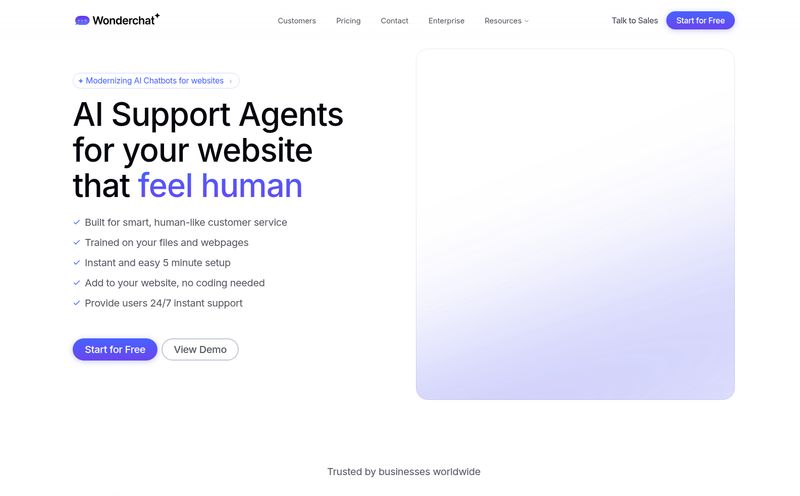Building a cool AI agent is one thing. Actually getting it to work outside of your local machine? That’s a whole different beast. I've spent more late nights than I'd care to admit wrestling with Docker files, cloud configurations, and obscure dependency errors, all just to get a simple agent online. It’s the unglamorous side of the AI boom, the plumbing that no one wants to talk about but everyone struggles with.
So when I stumbled upon a tool called Naptha AI, my interest was definitely piqued. The promise was bold: Turn any agents, tools, or orchestrators into an MCP Server, in seconds. Seconds? That's a claim. And the best part? No complex infrastructure, no vendor lock-in. Just bring your agent, and they'll handle the rest. It sounded almost too good to be true.
So What Is Naptha AI, Really?
Okay, let's break it down. At its core, Naptha AI is a bridge. It’s a library and platform designed to take your existing AI agent project—whether it's a simple tool or a complex multi-agent system—and convert it into something called an MCP server. Think of it like a universal adapter for your electronics. You have a brilliant European-made gadget (your agent), but you're in the US and the plugs don't match. Naptha AI is the adapter that lets you plug it right into the wall, no rewiring needed.
In this analogy, the “wall” is the growing ecosystem of MCP clients. These are applications like Cursor (the AI-first code editor) and the Claude Desktop app. They're built to communicate with agents using a standardized protocol. MCP, or the Multi-Agent Communication Protocol, is this emerging standard that allows different agents and clients to talk to each other without a ton of custom-built APIs. It's a huge deal for interoperability, and Naptha AI is positioning itself as the easiest way to get your agent speaking the language.
The Magic Behind the Curtain: Naptha AI's Key Features
The platform isn't just a concept; it has some tangible features that make this whole process work. After poking around, a few things really stood out to me.
Auto-MCP Conversion: The "One-Click" Dream?
This is the headline feature. Naptha AI claims to automatically convert your agent into an MCP-compliant server. Now, is it literally a single click? Not quite. The documentation notes that it requires some minor code changes for the conversion. But let’s not get bogged down in semantics. Compared to building a server from scratch, it’s a massive simplification. You're not architecting a new system; you're just adding a few lines to make your existing code compatible. For any developer who values their time, this is a godsend.
Instant Deployment Straight from GitHub
This is where my inner dev got really excited. You can point Naptha AI to a GitHub repository, and it handles the deployment. This workflow is just... clean. It fits right into how modern development works. You push an update to your agent on Git, and your deployed MCP server reflects those changes. No manual uploads, no SSHing into a server at 3 AM. It’s a continuous deployment pipeline for your AI agent, and that’s pretty fantastic.

Visit Naptha AI
A Future of Agent-to-Agent Communication
Right now, Naptha AI is focused on connecting your agent to clients (A2C). But they have Agent-to-Agent (A2A) support on their roadmap. And that's where things could get really interesting. Imagine a world where your specialized research agent could seamlessly hire a data-scraping agent, which in turn could pass its findings to a summarization agent. This is the multi-agent dream that projects like Auto-GPT hinted at, but the infrastructure has always been the missing piece. If Naptha nails A2A communication, it could become a foundational layer for teh next generation of autonomous AI systems.
My Honest Take: The Good and The Not-So-Good
No tool is perfect, especially not in the fast-moving AI space. After my initial excitement, I tried to look at Naptha AI with a critical eye. What I found was a tool with a very clear, very powerful value proposition, but with a few caveats you should know about.
On the upside, the freedom it offers is immense. The promise of no lock-in is huge. I’ve been burned before by platforms that make it easy to get in but impossible to leave. Naptha's approach feels different; since it’s converting your own agent, you still own the core logic. You're not building on their platform, you're just using it as a deployment layer. The ease of getting started and the direct GitHub integration are massive wins for rapid prototyping and iteration. You can go from idea to a shareable, usable agent incredibly fast.
However, it's not a magic wand for non-technical users. The mention of “some code changes” is important. You do need to be comfortable enough to modify your agent’s source code. This isn’t a drag-and-drop, no-code solution. It’s for developers who want to abstract away the DevOps, not the development itself. Also, the A2A support being “coming soon” means that for now, its primary use is for single agents connecting to clients. If your main goal is building complex, interacting swarms of agents, you might have to wait a bit.
The Million-Dollar Question: What's the Pricing?
Ah, the classic question. As of my writing this, Naptha AI hasn't made its pricing public. This is pretty common for new tools in this space—they're likely still figuring out their go-to-market strategy or are in a private beta phase. If I had to guess? I'd expect a model that scales with usage. Perhaps a generous free tier for hobbyists and solo devs to get their agents online, with paid tiers based on server uptime, traffic, or the number of agents deployed. This would align with standard PaaS (Platform as a Service) pricing and would make sense for their target audience.
For now, you'll have to reach out to them directly via their 'Join us' link. I'd say if the problem they're solving resonates with you, it's worth getting on their radar.
Who Should Give Naptha AI a Try?
So, who is this for? In my opinion, Naptha AI is a perfect fit for a few groups:
- Solo Developers & Hobbyists: If you're building cool agents in your spare time and want to share them or use them with tools like Cursor without the infrastructure headache, this is for you.
- Small AI Startups & Teams: For teams that need to move fast and prove concepts, offloading deployment complexity to a service like Naptha could be a huge competitive advantage.
- Researchers & Academics: When your focus is on the agent's logic and performance, you don't want to waste weeks becoming a cloud architect. This lets you focus on the research.
Frequently Asked Questions about Naptha AI
What exactly is an MCP Server?
An MCP (Multi-Agent Communication Protocol) Server is a backend application that speaks a specific, standardized language. This allows different frontend clients (like code editors or desktop apps) to interact with any agent that also speaks that language, promoting a more open and interoperable ecosystem.
Do I need to be an expert coder to use Naptha AI?
You don't need to be a DevOps expert, but you should be comfortable with coding in Python or whatever language your agent is written in. You'll need to make some small modifications to your code to integrate the Naptha AI library, so basic development skills are necessary.
Is Naptha AI open source?
The platform itself appears to be a proprietary service, but it works by integrating a library into your own projects, which could be open source. Their model is about providing a service for your code, rather than owning it.
How does it integrate with Cursor?
By converting your agent into an MCP server, you can then add it to Cursor as a custom agent source. This would allow you to, for example, use your own fine-tuned coding assistant directly within the Cursor IDE, which is a pretty powerful concept.
What does 'no lock-in' actually mean here?
It means the core intelligence—your agent's code—remains yours and isn't tied to Naptha's specific platform architecture. If you decide to leave, you still have your original agent code. You'd just need to find a new way to host it, but you wouldn’t have to rebuild it from scratch, which is a common problem with more integrated platforms.
A Simpler Way to Deploy AI Agents?
Look, the AI agent space is still the Wild West. There are a dozen ways to do everything, and most of them are complicated. Naptha AI is a refreshing take because it's not trying to reinvent the wheel; it's just trying to build a much better, smoother road for the wheels we already have.
It's a focused tool that solves a very specific, very annoying problem. By abstracting away the pain of deployment and embracing an open protocol like MCP, it’s making a smart bet on the future of AI. I'll be keeping a close eye on their progress, especially on that A2A feature. For now, if you're a developer with an agent sitting on your hard drive, Naptha AI might just be the easiest way to set it free.
Reference and Sources
- Naptha AI Official Website: Information gathered from the main page.
- Cursor: https://cursor.sh/



